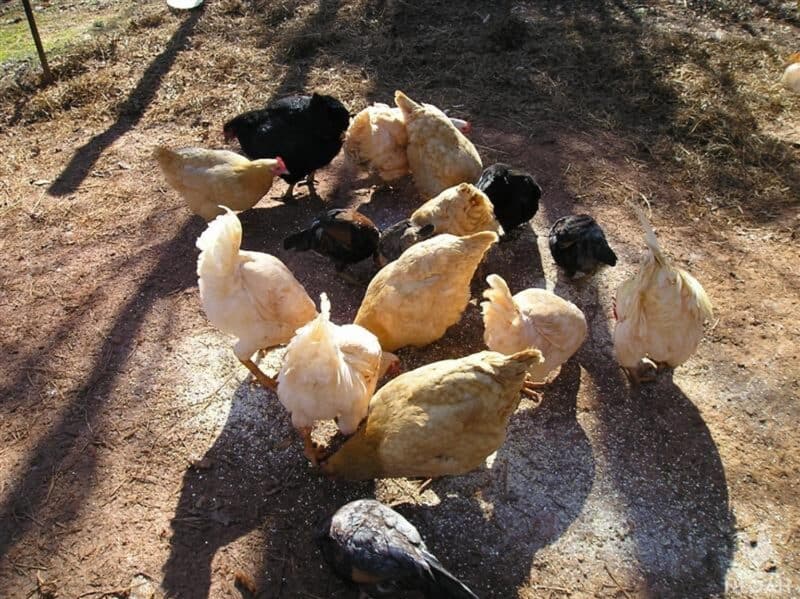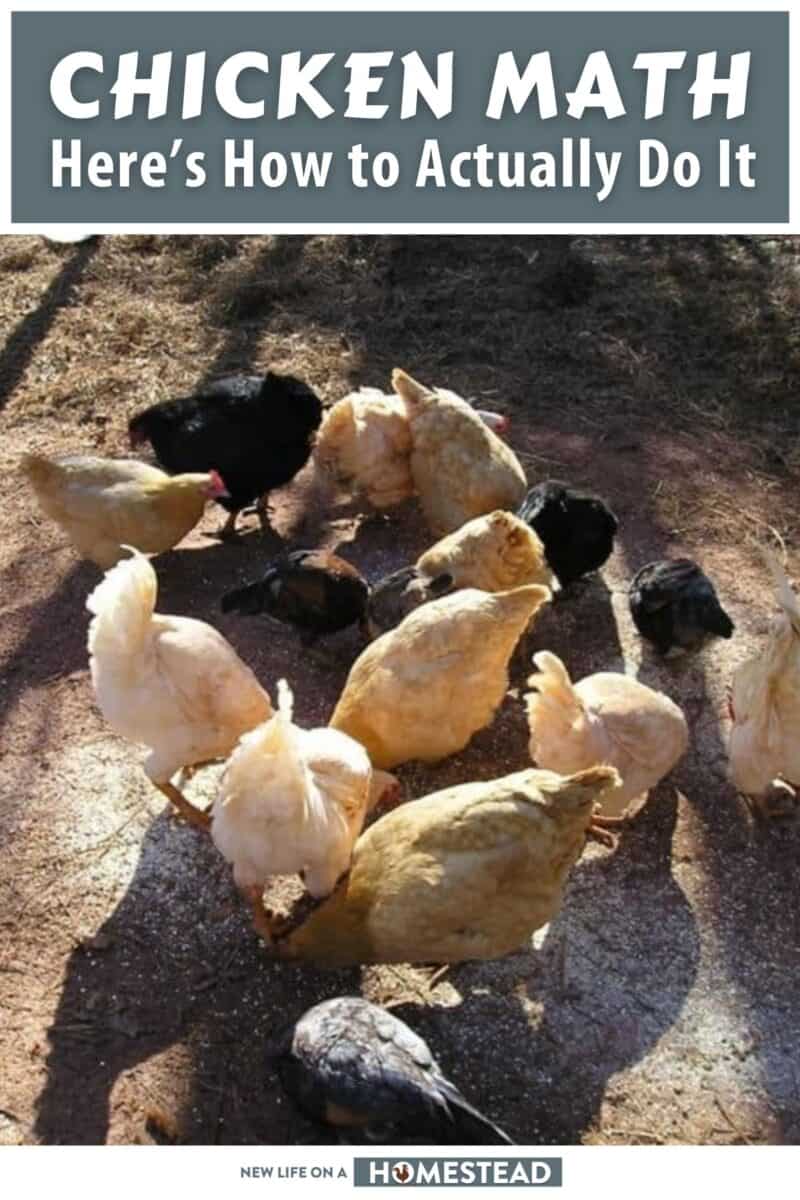[ad_1]
Do you keep chickens? Do you want to keep chickens? If you answered ‘yes’ to either of these questions you probably already know that this is one endeavor that is highly likely to get out of control.

No one seems to know why this happens: One day you come home with a starter flock of six chickens and the next thing you know you’ve got 20, then 50, now 100 or even more chickens running around all over the place. How does this happen?!
I’ll tell you how it happens: it’s from a lack of planning, and specifically it happens to chicken keepers that don’t take the time to learn Chicken Math™.
You’ve probably heard of the concept before even if you aren’t familiar with it, and though it’s sometimes treated humorously, it’s actually really serious business.
If you want to keep a handle on your flock and also keep control of your life, you’ll need to learn it, and the time has come. Let’s go!
What Does Chicken Math Mean?
Chicken math is really simple. Chicken math is nothing more than a proprietary and intricate method of assigning values to your chickens so that you can precisely calculate and manage the size of your flock and your additions to it. That’s it.
If it sounds simple to you, that’s because it really is. Even a child can learn chicken math, but when it comes to managing your flock’s new additions, losses and other acquisitions it can get surprisingly sophisticated.
Don’t be intimidated, I promise you’ll have a handle on it in no time…
Why Do You Need to Know Chicken Math at All?
One of the major obstacles to learning chicken math you must first overcome is your own incredulousness.
How hard can it be to just perform a head count on your flock to know how many chickens you have?
See, that’s mistake number one: A simple headcount seems satisfactory to the uninitiated, but it’s really anything but, because it doesn’t take into account the productivity or actual value of any given chicken according to the standards of chicken math.
Only by properly performing chicken math calculations with your flock, and with incoming additions, will you be able to crunch the numbers and arrive at usable data.
It will all make sense in the following sections, but if you understand the premise for now, keep reading.
How Do You Number Chickens?
Numbering your chickens, or rather assigning them a value, couldn’t be simpler.
Mature, adult chickens count as 1. That’s really all there is to it. Chicks should be assigned a value of 0 for reasons we will discuss.
Eggs, any egg, are always 0. It doesn’t matter if they are only minutes away from hatching or freshly laid. Eggs are zero, end of story.
You can already see where this varies somewhat from a simple head count. Adult chickens are counted, chicks and eggs are not. What a difference that makes!
If you have 10 adult chickens and 16 chicks with another 9 eggs in the incubator, you have a strict headcount of 35! Sheesh, that’s a big number! How did it get this bad?
Anyway, the good news is according to my chicken math, the correct math, you have only 10 adult chickens which count as 10; 16 chicks which have a net value of 0; and 9 eggs with another total value of 0.
Hence, just 10 chickens. That’s a nice, sane, easily explained number.
Numbering Chickens Keeps Your Chicken-Keeping On Track
The reason we spend so much time, ah, massaging the values of each individual chicken in our flock is because this is the only way to properly weight our purposes and intentions for them.
You’ll need to figure this out because once we run the numbers, that final value we get determines our destiny.
For instance, I said above that every adult chicken gets a value of 1. That is not strictly true: It’s a good rule of thumb, of course! But not always true…
For instance, any chickens that you plan on getting rid of in the near future, or rather let us just say at some point in the future, don’t get counted- value 0.
So if you have a few chickens in the example above that you are going to cull for whatever reason, maybe because they will wind up on the supper table, or because they are troublemakers that make your life difficult, they don’t get counted.
Let’s say there are two hens you plan on culling because they have stopped laying, and one rooster that is so ornery, so mean, you just can’t stand him anymore.
In that same example where we arrived at a value of 10 total chickens, since 3 of those chickens now have a value of 0 we would actually only end up with 7 chickens. A much nicer number, and way, way easier to explain!
No, I don’t have a problem. No, it is you that doesn’t understand. I know what I’m doing; raising chickens. That’s all. Used to be a citizen could do that without having his motives or sanity questioned.
Note that Chicken Valuations Can be Changed with No Notice
Here’s the part that is bound to trip up chicken math novices. It is entirely possible for the values of any given chicken to change under various circumstances, and furthermore change without notice!
This, ordinarily, would make running your calculations impossible. I want to let you in a little secret: only you can determine what these values are! Isn’t that genius? Isn’t that amazing? I think so too.
Putting It All Together
So let’s say you come home from the farm supply store with 6 chicks. I mean actual poultry; get your mind out of the gutter. How many chickens do you have? Correct, zero.
But in a few short weeks things start going so well with your new chickens that you just can’t stand to see them so lonely, and so you head back to the store for more.
You come back home with an astonishing 24 more chicks, which soon grow up into adult chickens.
Here we go again. Oh, man, that’s a lot of chickens… If my wife finds out she’s going to leave me.
Good thing the coop is on the opposite side of the property and they usually stay in the run. She won’t really see.
So, when she inevitably asks me how many chickens we have now, what’s the answer?
If you said 30, you have officially flunked this class. Put yourself in detention. But if you answered 12, you get a gold star, and pass with flying colors.
That’s because I’m counting 6 (for the original 6 that I brought home) and only another 6 out of the 24 new ones. How is that even possible?
That’s because all things are possible through chicken math: out of the 24 new chickens I brought home, 18 of them simply don’t count.
I need the numbers to make sense, and so they do, and that’s why I’m always grateful for learning chicken math.
So when my wife asks me how many chickens we have, I can tell her truthfully, with complete conviction and sincerity, that we have 12 and that’s the bottom line.
12 chickens, the same amount that any normal, well-adjusted person would have.
What Should You Do if Someone Tries to Check Your Math?
One of the worst of all possible outcomes in this exercise is that someone besides yourself goes to check your math.
They will, without fail, resort to the primitive and failure-prone headcount method we discussed earlier. I know that you know why a headcount is completely inadequate, but they don’t.
Worse, you can’t waste your time trying to explain that to them. You can’t explain that your favorite named chicken doesn’t really count because he’s more of a pet than a working animal.
They won’t get how one, single chicken can actually be half of a chicken. They simply cannot compute how the cute, fuzzy baby chick isn’t really a chicken yet for our purposes.
And to make things harder on them, chickens are funny: They scurry around to and fro in erratic patterns that are seemingly designed to confuse and annoy people.
Trying to actually count even a small number of chickens will quickly produce errors that become recursive, making the simple sum unattainable to untrained minds. That’s why chicken math is so important.
Chicken Math: The Guiding Light of Chicken Keeping
I pity them, these “normal” people, I really do. But, you must stand strong in your convictions and in your unassailable knowledge.
If your significant other or family member confronts you that your number is way, way wrong, all you have to do is lightly laugh it off and go on with your day.
They simply do not understand the issue at hand. They will never understand the bond, the connection, you have with your chickens. They can never understand. Never…

[ad_2]
Source link
Get more stuff like this
in your inbox
Don't Be Left Unprepared
Thank you for subscribing.
Something went wrong.



